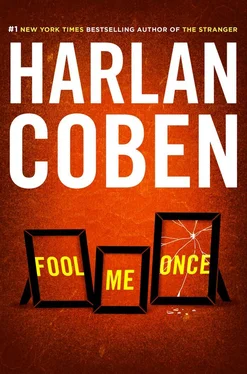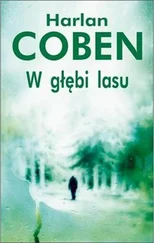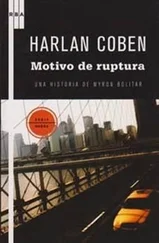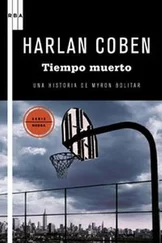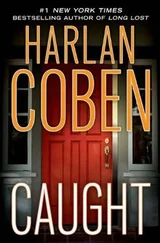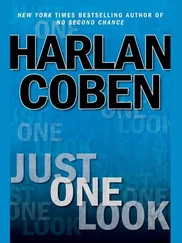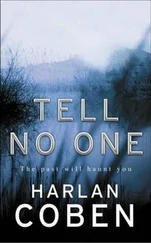The best approach, Maya quickly surmised, would be the direct one.
“Your husband has done work for the Burkett family for a long time.”
Blank face.
“I wanted to ask him about what he does.”
“I see,” Mrs. Douglass said.
“Do you know about his work with the Burketts?”
“You’re a Burkett, Maya, aren’t you?”
The question rocked Maya back a bit. “I married in, I guess.”
“That’s what I thought. And I saw that your husband was killed.”
“Yes.”
“I’m sorry for your loss.” Then: “Do you think Tom knows something about the murder?”
Again her bluntness threw Maya. “I don’t know.”
“But that’s why you’re here?”
“In part.”
Mrs. Douglass nodded. “I’m sorry, but I really don’t know anything.”
“I’d like to talk to Tom.”
“He’s not around.”
“Where is he?”
“Away.”
She started back toward the door.
“My sister was also murdered,” Maya said.
Mrs. Douglass slowed her step.
“Her name was Claire Walker. Does that name mean anything to you?”
“Should it?”
“Right before she was killed, she found out about the Burketts’ secret payments to your husband.”
“Secret payments? I don’t know what you’re trying to imply here, but I think you better leave.”
“What kind of work does Tom do for them?”
“I wouldn’t know.”
“I have your tax returns for the past five years.”
Now it was Mrs. Douglass’s turn to show surprise. “You... what?”
“More than half your husband’s yearly income has come from the Burketts. The payments are substantial.”
“So? Tom works hard.”
“Doing what?”
“I wouldn’t know. And if I did, I certainly wouldn’t say.”
“Something about those payments troubled my sister, Mrs. Douglass. A few days after Claire found out about them, someone tortured her and shot her in the head.”
Her mouth made a perfect O. “And you think, what, Tom had something to do with it?”
“I didn’t say that.”
“My husband is a good man. He, like you, served in the military.” She nodded toward the wall behind her. Beneath a plaque that read “Semper Paratus” were silver crossed anchors, the symbol of the esteemed boatswain’s mate. Maya had known a few BMs in the Navy. It was a proud distinction. “Tom worked as a town cop for almost two decades. He took early retirement after getting hurt on the job. He opened up his own firm and he works hard.”
“So what did he do for the Burketts?”
“I told you. I wouldn’t know.”
“Or say?”
“That’s right.”
“But whatever he did for them was worth nine or ten grand a month going back... how long?”
“I wouldn’t know.”
“You don’t know when he started with them?”
“His work was confidential.”
“He never talked about the Burketts?”
For the first time, Maya saw a chink in the woman’s armor as she said softly, “Never.”
“Where is he, Mrs. Douglass?”
“He’s away. And I don’t know anything.” She flung open the door. “I’ll let him know you stopped by.”
Most people have a pretty antiquated idea of what a shooting range/gun shop looks like. They picture musty animal taxidermy and bear pelts on the walls, dusty rifles lined up haphazardly, a cantankerous owner behind a counter wearing either early Elmer Fudd hunting gear or a wifebeater T-shirt with a hook for one hand.
That wasn’t the case anymore.
Maya, Shane, and their compatriots hung out at a state-of-the-art gun club called RTSP, which stood for Right To Self-Protect or, as some joked, Right To Shoot People. Forget dust — everything in here gleamed like new. The unfailingly solicitous employees all donned black polo shirts neatly tucked into khakis. The weaponry was laid out in glass cases like fine jewelry. There were twenty shooting ports altogether, ten for the twenty-five-yard-range shooter, ten for the fifteen-yarders. A digital simulator worked pretty much like a life-sized video game. Picture a theater room with some sort of hostile situation — gang attack, hostage taking, Wild West, even zombie infiltration — come to life with fully formed targets coming at you. You “shot” lasers with a real-weight firearm.
For the most part, Maya came to shoot real guns at paper targets and hang with her friends, most of whom had served in the military. This place served that purpose in what their advertisements called “comfort and style.” Some people join clubs to golf or play tennis or try their hand at bridge. Maya was a VIP member of the “Guntry Club.” Being ex-military, she and her friends had been given a fifty percent discount.
The Guntry Club on Route 10 had dark wood walls and rich carpeting and reminded Maya of either a faux version of the Burkett library or an upscale chain steak house. A pool table sat in the middle of the room. There was lots of leather furniture. Three walls were adorned with flat-screen televisions. The fourth was painted with the words of the Second Amendment, spelled out in enormous cursive letters. There was a cigar room, card tables, and free Wi-Fi.
Rick, the owner, also wore the black polo and khakis and always had a gun on his belt. He greeted her with a sad smile and a fist bump. “Great to have you back, Maya. Me and the boys, when we heard the news...”
She nodded. “Thanks for the flowers.”
“We just wanted to do something, you know?”
“I appreciate it.”
Rick coughed into his fist. “I don’t know if this is the right time to raise it, but if you need a job now with more flexible hours...”
Rick was constantly offering her a job teaching shooting classes. Women were the fastest-growing demographic for gun buyers and ranges like his. Women also greatly preferred female instructors, of which there were still very few.
“I’ll keep it in mind,” Maya said.
“Great. The boys are upstairs.”
There were five of the gang there that night, including Shane and Maya. The other three headed off to the simulator while Shane and Maya hit the twenty-five-yard range. Maya found Zen in shooting. There was something about the release of breath as you pulled the trigger, the stillness, the quiet before the almost-welcome recoil, that soothed and comforted her.
When they were done, they moved back up to the VIP room. Maya was the only woman. One might think that sexism would rule a place like this, but here, all that mattered was how good you shot. Maya’s military notoriety, if not heroism, also made her something of a local celebrity. Some of the guys were awed by her. Some harbored small-time crushes. It didn’t bother Maya. Despite what you might read, most soldiers were greatly respectful of women. In her case, they seemed to channel whatever feelings of attraction they possessed into something more chaste or brotherly.
Maya’s eyes skimmed over the words of the Second Amendment on the wall.
A well regulated Militia, being necessary to the security of a free State, the right of the people to keep and bear Arms, shall not be infringed.
Awkward grammar, to put it mildly. Maya had learned never to discuss or argue with those on either side. Her father, who had been adamantly anti-gun, used to snap, “You want your big assault rifle? What ‘well regulated militia’ are you with anyway?” while her pro-gun friends would always counter “What part of ‘shall not be infringed’ is confusing to you?” It was, of course, amazingly elastic phraseology and proved the adage that everyone always sees what’s in their interest. If you loved guns, you found this document to mean one thing. If you hated guns, you thought it meant another.
Читать дальше
